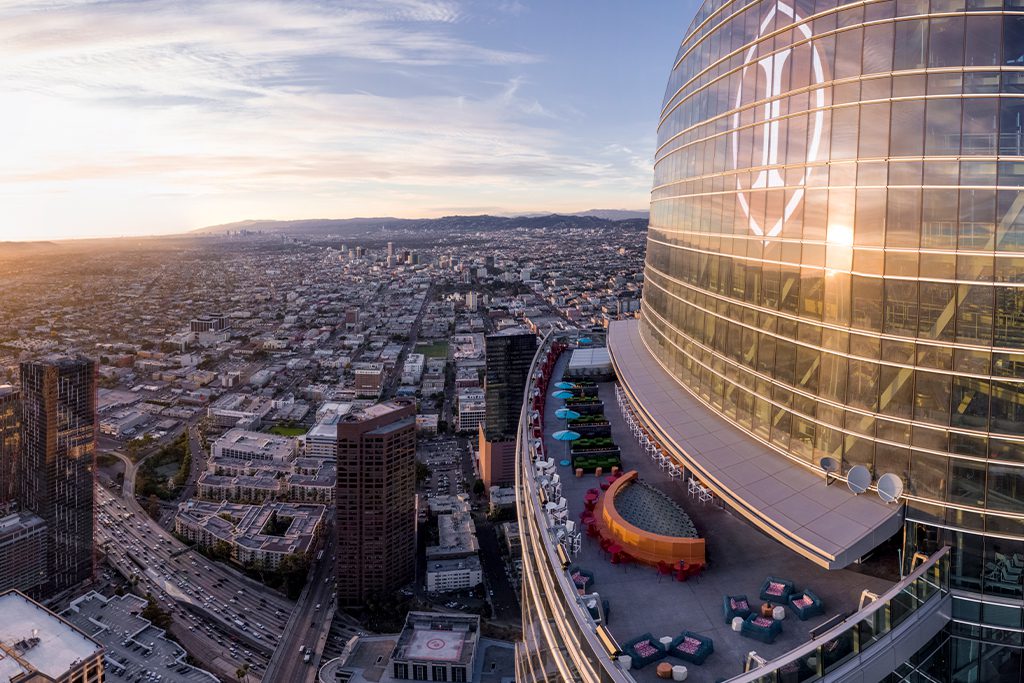Skift Take
When it comes to sustainability, the meetings sector is thinking well beyond environmental impacts. With the future of this multi-billion dollar sector on the line, planners and venues alike are dreaming up creative solutions to the biggest challenges facing meetings and events.
This sponsored content was created in collaboration with a Skift partner.
Today we’re publishing a new trend report in partnership with IHG: The Sustainable Future of Meetings and Events explores the tactics that both planners and venues are incorporating into their programs and the shifting consumer preferences driving the evolution of this all-important sector.
When it comes to sustainability, the meetings and events sector is doing much more than simply going green. Today, venues and planners alike are working to reduce their environmental footprint as well as create new models for this important segment of the travel industry. Stakeholders are amping up their work to better engage attendees with creative content that goes far beyond the ballroom. Host organizations are working with venue partners to deliver results that exceed traditional definitions of return on investment and create lasting community impact. All of these changes are representative of a sector-wide effort underway to both reduce the climate impact of events and grow the already massive business of in-person meetings well into the future.
Among the companies leading the shift is InterContinental Hotels Group (IHG), which has implemented a number of sustainability initiatives to meet the sourcing needs of planners and deliver positive impacts on the many communities in which IHG operates. And with nearly 850,000 rooms around the world, these changes are having a significant impact at scale.
Many of the shifts are now being adopted by the broader meetings sector, including a “lightening up” of venues by bringing in natural light, more interesting food and beverage options, and more engaging programming. Planners are discarding scripted seminars and bland presentations in favor of collaborative moments and memory-making activities that make even corporate gatherings feel more like leisure experiences. The concept of “creating shared value,” in which groups collaborate to generate measurable social impact is gaining currency. And venues and sourcing managers alike are carefully considering risk management practices that don’t disrupt the attendee experience.
In this trend report, SkiftX will illuminate the many changes underway in the sector, examine case studies and examples of how planners and venues alike are building sustainability into their practices, and recognize a number of leaders who are creatively rethinking the sorts of meetings that are possible in the 21st century.
While much is changing, said Jonathan Kaplan, vice president of global sales strategy, IHG, “the intangible value of experiences and connections within meetings and events is rising in priority across the globe.” All the more reason to make sure those events are truly sustainable.
Key Takeaways
“IHG is emerging as a leader in hospitality tech innovation and developing itself into a nimbler, more diversified company,” according to a recent Skift report, and one major factor in the company’s continued evolution is an embrace of meetings and events. This huge segment of the travel industry, already valued at $120 billion a year in the U.S. alone, represents major growth potential.
A number of considerations beyond “return on investment” are coming to the forefront for planners and attendees. Among them are environmental sustainability concerns, risk management, and community impact.
Sustainability is about more than just “greening” meetings. Planners and attendees alike are demanding “more human” events, with wellness programming, reasonable schedules, and top-flight food and beverage options.
Festivalization describes a new way of thinking about meetings, a transformation of the event from obligation to experience. By tapping into contemporary consumer preferences, planners and venues can entice a new generation of attendees.
The massive size of the global meetings and events business means that the sector, like others in the travel industry, has become both a source of risk and a target for outside actors. Addressing planner concerns is “absolutely critical,” said Jonathan Kaplan, vice president of global sales strategy at IHG.
Communicating the social impact of events and managing their environmental impact are two ways that planners and hospitality companies alike are working to secure the sustainable future of the meetings sector. “We as human beings realize our greatest potential when we come together,” said one planner.
In this report, you’ll find:
- Insights on major shifts underway in the meetings sector
- Interviews with key IHG executives about meetings innovation
- Research on new trends in event programming
- Details on managing risk and data security
- Meeting planner observations on the shift from “meetings” to “moments”
SKIFT REPORTS ARE NOW WORTH CE CREDITS WITH THE CMP PROGRAM
This report is worth 1 CE credit. To acquire credit through this or other content from EventMB (a Skift brand), please see here.
This content was created collaboratively by IHG and Skift’s branded content studio, SkiftX.
Have a confidential tip for Skift? Get in touch
Tags: climate change, hotels, ihg, intercontinental hotels group, meetings and events, sustainability

